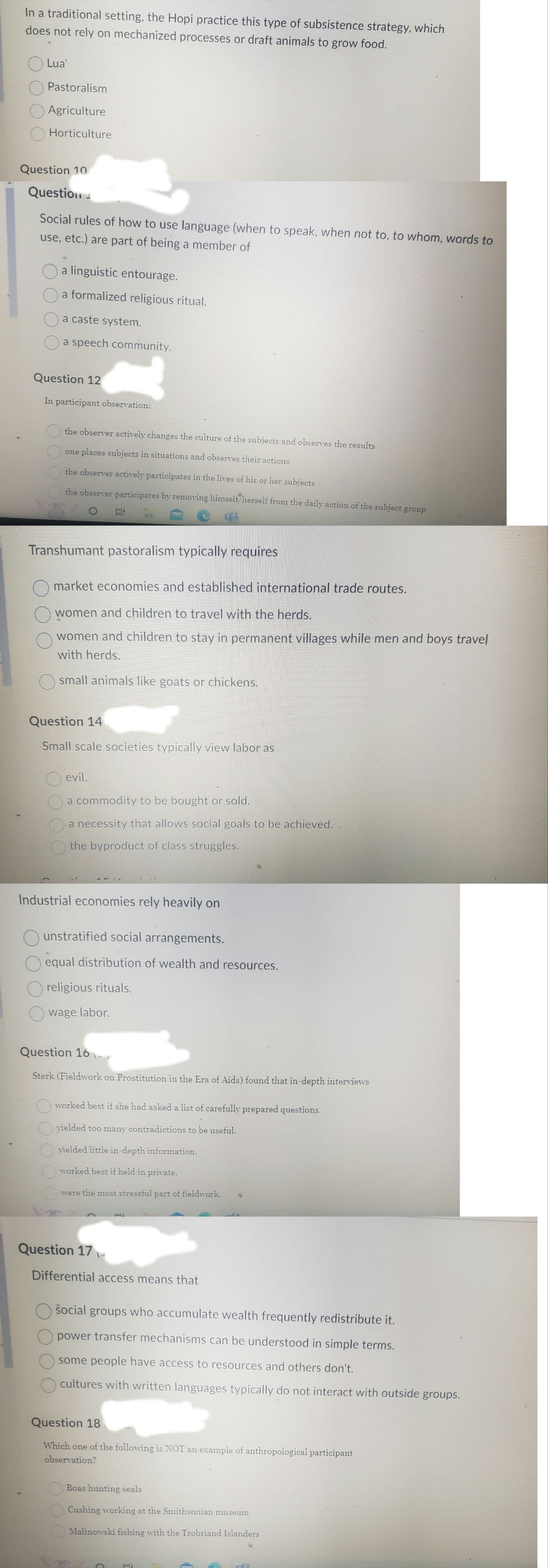In a traditional setting, the Hopi practice this type of subsistence strategy, which does not rely on mechanized processes or draft animals to grow food. Lua' Pastoralism Agriculture Horticulture Question 10
In a traditional setting, the Hopi practice this type of subsistence strategy, which does not rely on mechanized processes or draft animals to grow food. Lua' Pastoralism Agriculture Horticulture Question 10
Social Psychology (10th Edition)
10th Edition
ISBN:9780134641287
Author:Elliot Aronson, Timothy D. Wilson, Robin M. Akert, Samuel R. Sommers
Publisher:Elliot Aronson, Timothy D. Wilson, Robin M. Akert, Samuel R. Sommers
Chapter1: Introducing Social Psychology
Section: Chapter Questions
Problem 1RQ1
Related questions
Question

Transcribed Image Text:In a traditional setting, the Hopi practice this type of subsistence strategy, which
does not rely on mechanized processes or draft animals to grow food.
1
Lua'
Pastoralism
Agriculture
Horticulture
Question 10
Question
Social rules of how to use language (when to speak, when not to, to whom, words to
use, etc.) are part of being a member of
a linguistic entourage.
a formalized religious ritual.
O a caste system.
a speech community.
Question 12
In participant observation:
the observer actively changes the culture of the subjects and observes the results
one places subjects in situations and observes their actions
the observer actively participates in the lives of his or her subjects
the observer participates by removing himself/herself from the daily action of the subject group
25
Et I
C
Transhumant pastoralism typically requires
Omarket economies and established international trade routes.
Owomen and children to travel with the herds.
O
women and children to stay in permanent villages while men and boys travel
with herds.
Osmall animals like goats or chickens.
Question 14
Small scale societies typically view labor as
O evil.
O a commodity to be bought or sold.
a necessity that allows social goals to be achieved.
the byproduct of class struggles.
Industrial economies rely heavily on
Ounstratified social arrangements.
O equal distribution of wealth and resources.
O religious rituals.
wage labor.
Question 16-
Sterk (Fieldwork on Prostitution in the Era of Aids) found that in-depth interviews
O
O worked best if she had asked a list of carefully prepared questions.
yielded too many contradictions to be useful.
yielded little in-depth information.
worked best if held in private.
were the most stressful part of fieldwork.
Question 17
Differential access means that
social groups who accumulate wealth frequently redistribute it.
power transfer mechanisms can be understood in simple terms.
some people have access to resources and others don't.
O cultures with written languages typically do not interact with outside groups.
Question 18
Which one of the following is NOT an example of anthropological participant
observation?
Boas hunting seals
Cushing working at the Smithsonian museum
Malinowski fishing with the Trobriand Islanders.
Expert Solution
This question has been solved!
Explore an expertly crafted, step-by-step solution for a thorough understanding of key concepts.
This is a popular solution!
Trending now
This is a popular solution!
Step by step
Solved in 2 steps

Recommended textbooks for you

Social Psychology (10th Edition)
Sociology
ISBN:
9780134641287
Author:
Elliot Aronson, Timothy D. Wilson, Robin M. Akert, Samuel R. Sommers
Publisher:
Pearson College Div

Introduction to Sociology (Eleventh Edition)
Sociology
ISBN:
9780393639407
Author:
Deborah Carr, Anthony Giddens, Mitchell Duneier, Richard P. Appelbaum
Publisher:
W. W. Norton & Company

The Basics of Social Research (MindTap Course Lis…
Sociology
ISBN:
9781305503076
Author:
Earl R. Babbie
Publisher:
Cengage Learning

Social Psychology (10th Edition)
Sociology
ISBN:
9780134641287
Author:
Elliot Aronson, Timothy D. Wilson, Robin M. Akert, Samuel R. Sommers
Publisher:
Pearson College Div

Introduction to Sociology (Eleventh Edition)
Sociology
ISBN:
9780393639407
Author:
Deborah Carr, Anthony Giddens, Mitchell Duneier, Richard P. Appelbaum
Publisher:
W. W. Norton & Company

The Basics of Social Research (MindTap Course Lis…
Sociology
ISBN:
9781305503076
Author:
Earl R. Babbie
Publisher:
Cengage Learning

Criminalistics: An Introduction to Forensic Scien…
Sociology
ISBN:
9780134477596
Author:
Saferstein, Richard
Publisher:
PEARSON

Sociology: A Down-to-Earth Approach (13th Edition)
Sociology
ISBN:
9780134205571
Author:
James M. Henslin
Publisher:
PEARSON

Society: The Basics (14th Edition)
Sociology
ISBN:
9780134206325
Author:
John J. Macionis
Publisher:
PEARSON